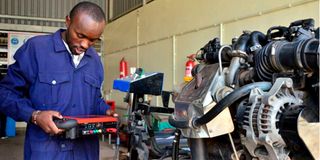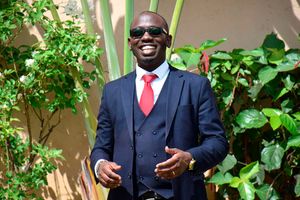
Paul Odoyo, a Mechanical Engineering student, operates a lathe machine during a practical session at Kisumu National Polytechnic on February 24, 2020.
| File | Nation Media GroupEducation
Premium
The pursuit of knowledge, or happiness? How engineering lost its glamour
Truth be told, the title ‘engineer’ has that magical ring and respect that surrounds it. The only drawback to it is the high rate of joblessness among graduates in various fields of engineering.
This is causing a great deal of concern among parents and has recently triggered debate as to whether the once-upon-a-time prestigious course is overrated in the job market.
The irony of it all is that there is a huge shortage of engineers in the country even though universities and other tertiary institutions are churning them out by their thousands each year.
Engineering courses are still attracting students who score highly in mathematics and physics, only to waste them as they tarmac for ages seeking employment.
Pursue engineering
At the same time, many gifted students have opted to pursue engineering in established universities but after several years of study, they are rudely informed that some professional body has pulled out the accreditation from these institutions, rendering the graduates and their degrees worthless.
This cruel turn of events has left many in tears.
Technical University of Kenya (TUK) vice-chancellor Francis Aduol admits that employment of engineering graduates is low, saying most students are only pursuing such courses ‘for an academic challenge’.
“Engineering is not overrated and it remains one of the best courses with more employment opportunities across the world. Engineering students are gifted in mathematics and physics. They pursue it for knowledge and skills,” he says.
Despite there being a shortage of engineers in the country, Prof Aduol says the paradox in Kenya is that graduates are unable to find the jobs.

Newton Mathenge, an Automotive Engineering student demonstrates how a system diagnosis is done on a diesel powered car engine on February 27, 2019.
A December 2019 report by the Engineering Board of Kenya (EBK) showed that the country had only 2000 certified engineers against a demand of 20,000.
Yet, universities churn out about 2,500 engineers annually.
“The country is not heavily investing in road construction, manufacturing industry, surveying and other hands-on sectors where our graduates can get absorbed immediately after graduation,” says Prof Aduol.
Investors have also raised concerns of skills mismatch among graduates. “Most international firms feel local graduates are not well trained so they always hire expatriates,” he offers.
Prestigious courses
When engineering courses were introduced at the University of Nairobi, the last thing students thought about was employment. At the time, the nation needed them in different fields.
Other than engineering, other prestigious courses are medicine and law. “The competition is usually between who should study medicine, engineering or law,” says Prof Aduol.
The Kenya Universities and Colleges Central Placement Service (Kuccps) report shows that out of the 122,831 candidates who secured placement to degree courses, 66,661 or 54.27 per cent, joined science, technology, engineering and mathematics (Stem) programmes. Some 42,267, representing 63.41 per cent, were male.
About 5,000 pursued engineering. During the 2019-2020 placement, out of 89,486 students, 57,687 or 64 per cent, pursued Stem courses. Engineering attracted 4,560.
The popular programmes are civil, electrical and telecommunication, mechanical, software, aeronautical, surveying, computer, plant and structural (architectural) engineering.
The top engineering schools are at Moi University, University of Nairobi, Technical University of Kenya (TUK), Jomo Kenyatta University of Science and Technology (JKUAT) and Technical of Mombasa (TUM).
Others are at Egerton University, Dedan Kimathi University of Science and Technology (Dekut), Meru University of Science and Technology (Must), Multimedia University of Kenya and Kenyatta University.
Prof Aduol says universities should abandon old teaching methods and invest in modern equipment that can prepare students for the job market.
Technology transfer
“There has not been technology transfer from industry to universities. Engineering students should be attached to government projects to ensure they acquire modern skills before graduating,” he observes.
A Unesco report released last month revealed that African countries were producing ‘low quality engineers’.
Titled, ‘For sustainable development: Delivering on the sustainable development goals’, it showed Africa has the lowest engineering professionals per capita.
“Without high quality engineering, development in key sectors risks remaining stagnant,” states the report.
Prof Aduol urges universities to align programmes with market needs. “The challenge for universities is that engineering programmes will require a lot of revamping in terms of quality and staffing,” he says.
“We’ve not had a serious discussion on engineering. Initially, it was scientific. Nothing has been done since the 1960s to improve it.”
There’s also a huge shortage of lecturers, which is affecting the quality of teaching.
“Engineering courses have not been an interesting area for graduates to further their studies, an overwhelming number of students tend to get employment opportunities with only a few going back to do their masters and PhDs,” says Prof Aduol.
“The few graduates who go back to universities as tutors often stop teaching when they get international scholarships.”
Most corporations in the West employ graduate engineers from developing countries on scholarship in their cities. The situation has left most universities with ageing professors and a few junior lecturers to continue teaching.
Professional engineers
The Engineers Board of Kenya and Institution of Engineers of Kenya (IEK) are partly to blame due to tough guidelines that make it difficult for graduate engineers to find jobs.
There are over 15,000 registered graduate engineers and 2,000 professional engineers. More than 30,000 graduates are yet to be registered, raising questions on their whereabouts.
Universities have also been facing accreditation challenges.
In 2018, Jaramogi Oginga Odinga University of Science and Technology, Meru University of Science and Technology, South Eastern Kenya University, Technical University of Kenya and University of Eldoret were excluded from the accreditation.
This meant students graduating from these universities were not recognised by the EBK and therefore could not get a practicing certificate.
In June last year, universities got a reprieve after the High Court ruled that only the Commission for University Education has the sole powers of accrediting programmes. This resulted in a tussle between EBK, IBK and CUE over accreditation.
Speaking to the Nation, Commission for University Education (CUE) chief executive Mwenda Ntarangwi said before a university is approved to offer any programme, it must meet the minimum infrastructural and quality requirements.
“The engineering programmes being offered at the universities have been inspected and are accredited, the courses are also among the best preferred by students,” he said. Efforts to get response from the EBK were futile.




